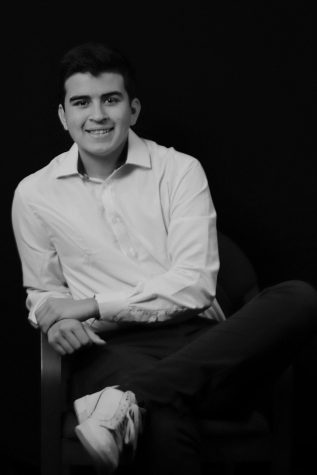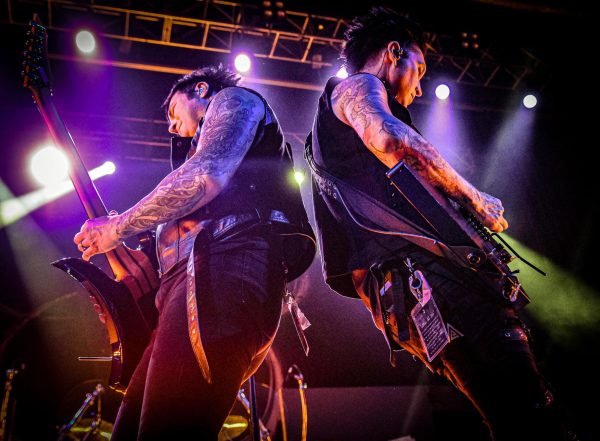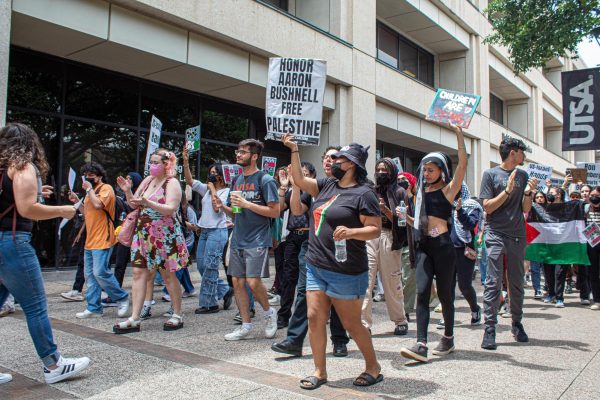UTSA cuts Italy study abroad short over coronavirus
Gondola rides through Venice, Italy. UTSA recently decided to recall all students, faculty and staff from Italy study abroad programs.
March 4, 2020
UTSA is recalling all 70 students, faculty and staff from study abroad programs in Italy, according to an email to students from President Dr. Taylor Eighmy on March 2. In another email sent to students on behalf of Vice Provost for Global Initiatives and Senior International Officer Dr. Lisa Montoya on Feb. 28, Montoya addressed the UTSA community and explained the decision was made because of concerns that countries may close their borders to Italy due to the spread of a new strain of coronavirus, or COVID-19, in the country. Some students who were studying abroad in Italy have criticized the way the university implemented the decision and communicated with students, saying it was disorganized and “filled with uncertainty.”
Eighmy’s email indicated that no students, faculty or staff had reported symptoms of the disease. However, all will be medically screened upon return to the U.S. by UTSA Medical Director Dr. Beth Wichman.
According to a FAQ about the decision, all students, faculty and staff “will be required to self-isolate for 14 days after their return.” This is not the same as a formal quarantine and will be conducted “similar to how one manages a cold or flu,” the FAQ said.
Students began flying out of Rome, Italy, on Feb. 29, one day after Montoya’s publicly released statement, and the last flights left on March 2.
Dr. Mary McNaughton-Cassill, a UTSA psychology professor who has been in Urbino as a part of the program, explained how UTSA has helped students get home.
“UTSA has helped students rebook their flights and chartered a bus to get us from Urbino to Rome,” McNaughton-Cassill said.
Return flights have been arranged by UTSA at no cost to students unable to have flight charges waived by airlines.
For students who had already paid for return flights, “UTSA will work with them to pay those charges,” an older version of the FAQ stated.
However, some students said the financial assistance only came after they pressured the university.
Senior political science major Geoffrey Okolo, who was studying abroad in Urbino, Italy, shared his perspective on how UTSA decided to financially assist students returning to San Antonio.
“The plan to evacuate was filled with uncertainty,” Okolo said. “Most of the steps taken by UTSA and outlined in [its] FAQ page was not planned for by the school; rather, we had to push and argue for these (ex. Bus to airport, plane tickets, housing upon arrival at UTSA for displaced students, reimbursement of fees, etc.).”
Junior architecture major Caleb Hill, who was also studying abroad in Italy, described frustration with the university’s handling of the situation, even though he agreed recalling students was likely the right decision.
“It wasn’t until pressure was applied by us students that we even got a bus to the airport in Rome,” Hill said. “Originally, they were forcing us to try to book our own flight home, which I was able to do with a lot [of] time dealing with airline customer service. But many people were hitting roadblocks with their airlines that were going to force people to pay insane prices for an evacuation they had no say in.”
Okolo described what students experienced leading up to the university’s decision.
“On Thursday, February 27, we were told that we would be hunkering down in Urbino, canceling day trips and abiding by travel restrictions due to the coronavirus and the reaction of the Italian government,” Okolo said. “On Friday, February 28, we were called for an emergency meeting where they told us that we would be leaving Italy. Before they informed the students, however, they had released a public statement on UTSA’s website.”
McNaughton-Cassill shared a similar account of the way UTSA informed students about the recall.
“We found out about the decision last night around 5:00 [p.m.] Urbino time, but some of the students had already received emails from folks in San Antonio who saw the general UTSA message,” McNaughton-Cassill said.
Okolo described how he and other students responded to being recalled from Italy.
“I personally felt UTSA made a decision without our input and momentarily left us to deal with the fallout,” Okolo said. “It was stressful on so many fronts … Many students were angry, sad and frustrated at the whole situation.”
Hill criticized the way the university handled the situation.
“I feel like we have been steadily misinformed and no input from the students has been taken into account,” Hill said. “It seems as if the university is really not worried about our actual well-being but rather protecting itself from liability.”
Hill was also critical of UTSA changing its decision about housing students once they return to UTSA.
“At this moment in time, which is while we are on flights back to San Antonio, they are not providing us with a place to stay for the [self-isolation] that they are requiring of us,” Hill said. “After they told us that we would be housed [on-campus] for that period of time … Instead, they are shifting the responsibility to our families and spreading us across Texas.”
An older version of the FAQ page posted by the university said UTSA would provide free on-campus housing for students who do not have a housing option in San Antonio upon returning from Italy for their self-isolation period. It also said that students would be provided with meals and other support during their 14-day self-isolation period.
However, in an email to students on March 2, Eighmy changed course, requiring students to live off campus during their self-isolation period. The decision was based on standard practices of the CDC and San Antonio Metro Health and guidance from the UT System.
“[This morning] I … informed [students, trainees, staff and faculty currently overseas] about requirements for self-isolation off-campus for 14 days before returning to school or work,” Eighmy said.
Students will be provided with a “standard per diem to cover daily meals and incidental costs during the 14-day self-isolation period,” the FAQ states. “At the conclusion of the 14-day self-isolation period, UTSA will provide all students with on-campus housing and a meal plan for the remainder of the semester at no cost to the student or their family.”
Although Okolo said he understood how the urgency of the situation could have affected the university’s response, Okolo believed UTSA still should have better communicated with students.
“When administrative actions can greatly affect our lives … the least they can do is communicate with us,” Okolo said.
UTSA Chief Communications Officer Joe Izbrand responded to student critiques of the university’s response.
“This was a time-sensitive situation and we prioritized actions based on the most pressing needs,” Izbrand said. “That meant first coordinating with airlines on access to flights, arranging transportation from Urbino to the airport, and communicating schedules to students. Once those efforts were underway, university leaders assessed other factors including credits for program fees and per diem for students while in self-isolation. Our foremost priority is the health and safety of our students and we’re confident they understand that, in a situation like this, you respond to the greatest needs first.”
UTSA is also waiving the final study abroad payment for students.
“UTSA will waive the final payment of $2,300 scheduled for March 15,” the FAQ stated. “For those students who have already paid their fees in full, a credit of $2,300 will be applied to their UTSA bill.”
Students returning from Italy will continue coursework online and will be allowed to return to classes following Spring Break on March 16, given they are not exhibiting flu-like symptoms.












